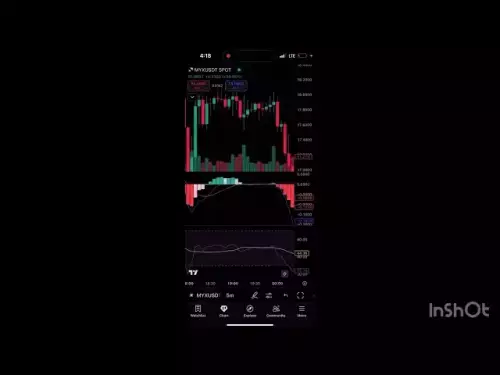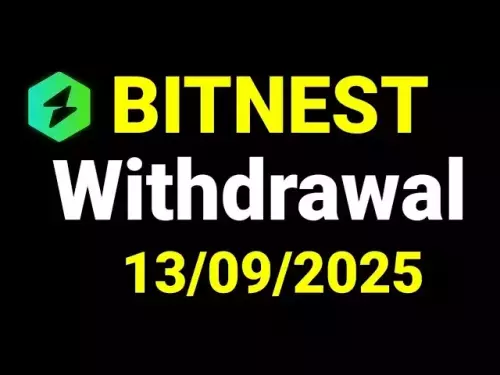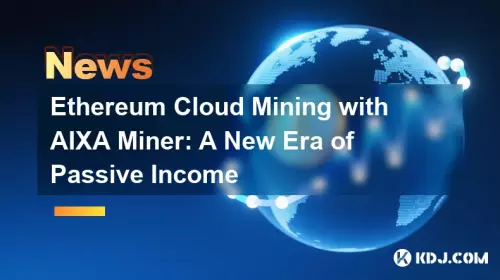 |
|
 |
|
 |
|
 |
|
 |
|
 |
|
 |
|
 |
|
 |
|
 |
|
 |
|
 |
|
 |
|
 |
|
 |
|
Cryptocurrency News Articles
Ethereum, AI, and Blockchain: A New Era of Decentralized Innovation
Sep 16, 2025 at 07:12 am
Ethereum is positioning itself as the nexus for AI and blockchain, fostering decentralized AI infrastructure and revolutionizing traditional finance.

Ethereum, AI, and Blockchain: A New Era of Decentralized Innovation
The convergence of Ethereum, AI, and blockchain technology is creating unprecedented opportunities for decentralized innovation. Ethereum is emerging as the preferred platform for AI agents and decentralized finance (DeFi), promising to reshape industries and redefine trust.
Ethereum's Bold AI Vision
The Ethereum Foundation's launch of the dAI Team signals a pivotal moment. Announced on September 15, 2025, by research scientist Davide Crapis, the dAI Team aims to make Ethereum the go-to settlement and coordination layer for AI and the machine economy. This initiative focuses on enabling AI agents to conduct payments and coordinate without traditional intermediaries, building a decentralized AI stack that reduces reliance on centralized platforms.
This strategic move aligns with Ethereum's core principles of neutrality, verifiability, and censorship resistance, making it an ideal foundation for intelligent systems. A key near-term priority involves advancing the ERC-8004 standard, a mechanism to prove the identity and trustworthiness of AI agents, facilitating coordination without centralized gatekeepers.
Revolutionizing Finance with Ethereum
Beyond AI, Ethereum is poised to disrupt traditional finance. Experts like SharpLink CEO Joseph Chalom and EigenLayer founder Sreeram Kannan highlight Ethereum's potential to replace Wall Street's outdated settlement infrastructure. Ethereum's atomic settlement capabilities execute trades in seconds without counterparty risk, contrasting sharply with the day-long settlement periods of current systems.
Ethereum's programmable nature enables portfolio rebalancing through smart contracts, dividend distribution in minutes, and composable transactions, allowing any asset to trade against any other asset at any time. Kannan emphasizes Ethereum as “the platform for verifiable trust,” solving counterparty risk through cryptographic verification.
Tokenization and the Future of Markets
The London Stock Exchange Group (LSEG) launched its blockchain-based Digital Markets Infrastructure (DMI) platform on September 15, marking a significant step in making private market transactions more efficient. This platform handles the entire lifecycle of an investment on blockchain rails, from issuance to post-trade settlement.
Tokenization, the process of creating digital representations of real-world assets, is gaining traction, especially in the UK. The Financial Conduct Authority (FCA) supports fund tokenization, signaling strong regulatory backing. If LSEG’s new platform proves successful, it could increase blockchain adoption in mainstream capital markets.
The Road Ahead: Challenges and Opportunities
While the potential of Ethereum, AI, and blockchain is immense, challenges remain. Regulation, valuation, and market structure complexities need addressing. However, the ongoing education and adoption among institutional investors, highlighted by the launch of Ethereum ETFs, indicate a promising future.
Final Thoughts
From revolutionizing finance to anchoring emerging technologies, Ethereum is setting the stage for a new era. As Ethereum evolves, its role as a foundational layer for the future machine-to-machine economy becomes increasingly clear. Who knows, maybe one day your self-driving car will be negotiating its insurance rates on the Ethereum blockchain – now that's a future I'd like to see!
Disclaimer:info@kdj.com
The information provided is not trading advice. kdj.com does not assume any responsibility for any investments made based on the information provided in this article. Cryptocurrencies are highly volatile and it is highly recommended that you invest with caution after thorough research!
If you believe that the content used on this website infringes your copyright, please contact us immediately (info@kdj.com) and we will delete it promptly.





























































